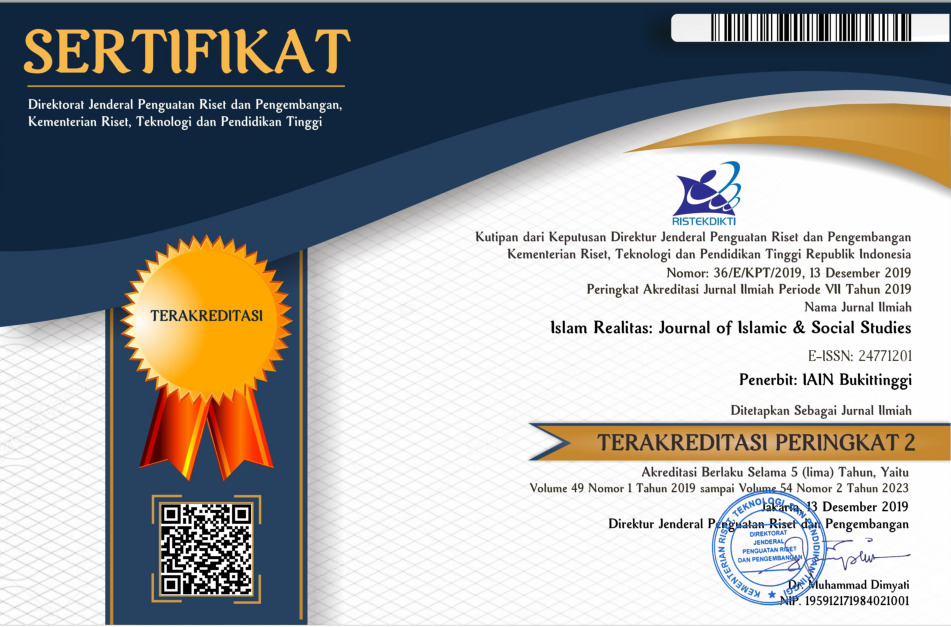BANGLADESHI MUSLIM CONSTRUCTION WORKERS IN SINGAPORE: A STUDY IN THE PROCESS OF MIGRATION AND EMPLOYMENT
Downloads
Singapore  has a long history  of receiving  labor  migrants  from all across South Asia and it has systematically  developed  a whole  range of strategies  to deal with  the shortage  of labourers  in the country.  Recent research has shown that to fulfill these shortages, large numbers of labourers are hired from Bangladesh Muslim. These labourers are temporary migrants and work in various construction sites in the country. Using field  research  (unstructured  interviews  and purposive  sampling)  as the  chief  method,  with  supporting  secondary data  from  library  research  newspaper  archives  and internet,  this  research focuses on Bangladesh's  migrant  workers  in Singapore specifically working  in the construction  sites. It will  look at what goes into the decision making or the choice of a certain  foreign  country  over  the  other  and the  role  of the  family  in the  decision  making  process.  Understanding  the process of socialization  among these  migrants  and how they  try to  bridge the gaps between  their  home  and the foreign work  place by creating a home away from  home, will  also be highlighted. Â
Singapura memiliki sejarah panjang menerima tenaga kerja migran dari seluruh Asia Selatan dan telah sistematis mengembangkan berbagai macam strategi untuk menghadapi kekurangan buruh di negara ini. Penelitian terbaru menunjukkan bahwa untuk memenuhi kekurangan tersebut, sejumlah besar buruh dipekerjakan dari Bangladesh Muslim. Para buruh ini merupakan migran sementara dan mereka bekerja di berbagai konstruksi di negara ini. Dengan menggunakan penelitian lapangan (wawancara terstruktur dan purposive sampling) sebagai metode utama, dengan didukung oleh data sekunder dari perpustakaan, arsip, koran, penelitian, dan internet, penelitian ini berfokus pada pekerja migran Bangladesh di Singapura secara khusus bekerja di lokasi konstruksi. Penelitian ini akan melihat apa yang terjadi dalam pengambilan keputusan atau pilihan dari negara asing tertentu atas yang lain dan peran keluarga dalam proses pengambilan keputusan. Memahami proses sosialisasi di antara para migran dan bagaimana mereka mencoba untuk menjembatani kesenjangan antara keluarga dan tempat kerja asing dengan menciptakan suasana seperti dirumah sendiri meskipun mereka jauh dari rumah juga akan disorot.Books
Amin, Samir, (1976), ‘Unequal Development: An Essay on the Social Formations of Peripheral Capitalism’. New York: Monthly Review Press.
De Haas H., (2006), Turning the tide? Why ‘development instead of migration’ policies are bound to fail.Oxford: International Migration Institute. University of Oxford.
Faist, Thomas, (1997), ‘The Crucial Meso-level’ in International Migration, Immobility and Development: Multidisciplinary Perspectives. Edited by Hammar, Brochmann Tamas, Faist. New York: Berg-Oxford International Publishers ltd.
Lewis, David, (2011), Bangladesh: Politics, Economy and Civil Society. New York. Cambridge University Press. Portes, Alejandro & John Walton, Labor, Class, and the Inlernaiional System. New York: Academic Press. Sjaastad AH.962. The Costs and Returns of Human Migration. Journal of Political Economy. (1981)70:80-93
Todaro MP, Maruszki L., (1987), Illegal migration and US immigration reform: A conceptual framework.Population and development review. 13:101-14
Wallerstein, Immanuel, (1980), The Modern World System II: Mercantilism and the Consolidation of the European World-Economy, 1600-1750, Academic Press.
Todaro MP. A model of labor migration and urban unemployment in less-developed countries. American Economic Review. 59:138-48. (1969).
Internet Sources
MOM‘s “Step-by-Step Guide to Cancel a Foreign Worker‘s Work Permit via WP Onlineâ€: http://www.mom.gov.sg/publish/momportal/en/communities/work_pass/work_permit/cancellation. html (accessed 20 May 2013)
Speech by the Minister http://www.news.gov.sg/public/sgpc/en/media_releases/agencies/mica/transcript/T-20080819 2.print.html? AuthKey Ministry of Manpower, ‘Overview of work passes’: http://www.mom.gov.sg/publish/momportal/en/communities/work_pass/overview_of_work_passes.html(accessed 20 May 2013).
TWC2, ‘Cuff Road Project’: http://www.twc2.org.sg/site/volunteer/cuff-road-project.html (accessed 23 May 2013).
Healthserve: http://www.healthserve.org.sg/ (accessed 22 May 2013) Ministry of Manpower, “Foreign Manpower Management Divisionâ€: http://www.mom.gov.sg/publish/momportal/en/about_us/divisions_and_statutory/foreign_manpower_management.html (accessed 17 May 2013).
Newspaper Article/Reports
Lin Yanqin “When things go wrong for themâ€, TODAY, October 22, 2008.
Leong Wee Kiat, ‘Are these workers just the tip of the iceberg’, TODAY, December 31, 2008. Melissa Sim, ‘200 foreign workers show up at MOM’, The Straits Times, April 28, 2009.
Tan May Ping & Shree Ann Mathavan, ‘Let‘s tell MOM’, The New Paper, 1 January 2009.
Leong Wee Kiat, ‘Left to their fate’, Today, December 18, 2008
Nicholas Yong & Samuel He, ‘55 foreign workers get the boot’, The Straits Times, January 14, 2009. Jermyn Chow, “More safeguards for foreign workersâ€, The Straits Times, September 26, 2009
Radha Basu, “When things go wrongâ€, The Straits Times, January 31, 2009.
Francis Chan, ‘Foreign worker levy to increase over 3 years’, The Straits Times, February 23, 2010
Authors who publish with this journal agree to the following terms:
- Authors retain copyright and grant the journal right of first publication with the work simultaneously licensed under a Creative Commons Attribution License that allows others to share the work with an acknowledgment of the work's authorship and initial publication in this journal.
- Authors are able to enter into separate, additional contractual arrangements for the non-exclusive distribution of the journal's published version of the work (e.g., post it to an institutional repository or publish it in a book), with an acknowledgment of its initial publication in this journal.
- Authors are permitted and encouraged to post their work online (e.g., in institutional repositories or on their website) prior to and during the submission process, as it can lead to productive exchanges, as well as earlier and greater citation of published work (See The Effect of Open Access).









